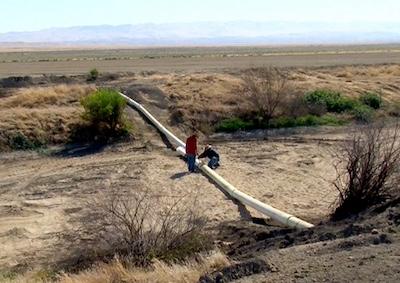As a media artist and a scholar, John Thornton Caldwell has built a distinguished career around exploring communities of labor in crisis and flux. A Distinguished Research Professor of Cinema and Media Studies at UCLA, Caldwell has helped pioneer the field of production studies in works that examine how below-the-line film and television workers in Hollywood have adapted to globalization and technological change, including Production Culture: Industrial Reflexivity and Critical Practice in Film and Television (Duke University Press, 2008) and Specworld: Folds, Faults, and Fractures in Embedded Creator Industries (UC Press, 2023). In his work as a filmmaker, Caldwell relies on fieldwork and ethnographic research to document the exploitation and resistance of migrant farmworkers and rural labor communities in central and southern California. Each practice informs the other in Caldwell’s larger project of making visible what our cultural politics and economic policies work to normalize or keep hidden altogether in what he has described as America’s “new suburban plantation culture.” This timely program brings together a selection of Caldwell’s experimental documentaries and agitprop videos that trace the history and persistence of migrant worker exploitation and labor organizing in rural California as well as the deep and tangled roots of the white grievance feeding the populist rhetoric of the current election cycle. The Archive is thrilled to present these works with Caldwell in person and in conversation with community filmmaker Devora Gomez and Jasmine Nadua Trice, Associate Professor of Cinema and Media Studies at UCLA.
In conjunction with this in-person screening at the Billy Wilder Theater, the Archive will host two additional immigration-focused documentaries available to view for free on the Archive’s Vimeo channel: Amor Vegetal: Our Harvest (Devora Gomez, John T. Caldwell, 1996) and Freak Street to Goa: The Migratory Patterns of Hippies on the Subcontinent (John T. Caldwell, John L. Pudaite, 1989).
Rancho California
U.S., 2002
Premiering in the Frontier section at the Sundance Film Festival in 2002, John T. Caldwell’s experimental, ethnographic documentary explores the internal borders that extend well beyond the international line between Mexico and America, sharply dividing migrants in Orange and North San Diego Counties from the affluent suburbs that depend on their labor. In ravines and arroyos, migrant workers, including families, live in shanty enclaves in the shadow, literally in some cases, of the gated communities where they work. Working closely over several years, with Indigenous labor activists and Devora Gomez, Caldwell dissolves the line between filmmaker and subject by including forms of migrant self-representation that underscore the humanity systemically erased by design from the suburban consciousness.
DCP, color, in English and Spanish with English subtitles, 58 min. Director: John T. Caldwell.
Boron Lockout
U.S., 2012
In 2010, the isolated town of Boron, California, in the high Mojave Desert became the center of a global labor action after transnational mining company Rio Tinto suddenly suspended its contract negotiations and locked out the workers of its borax mine there. In this “off-the-grid” town, ILWU miners protested at the mine gates but also deployed creative media strategies through YouTube and other social media platforms to disrupt Rio Tinto’s PR campaign and rally miners from Turkey, London and Melbourne to their cause. Boron Lockout is a galvanizing reminder of the power of collective action wherever you are.
DCP, color, 19 min. Director: John T. Caldwell.
Land Hacks (Masculine Media Anxiety Disorder)
U.S., 2020
In his latest experimental documentary, the two streams of Caldwell’s research interests come together in a rush. Parallel with an interrogation of Kern County, California, as a backdrop for Hollywood's representations of rural communities — from John Ford’s The Grapes of Wrath (1940) to Zach Galifianakis’ Baskets (2016–2019) — Caldwell carries out a deep dive into the actual history of labor struggle, racial tensions and environmental destruction that has marked its actual residents. It’s a heady mix of critical theory, ethnographic fieldwork and media archaeology that frames mining, industrial agriculture and film production as a single economy of extraction that yields, alongside vast profits, a culture of white masculine victimization and an ever-expanding rural-urban divide.
DCP, color, in English and Spanish with English subtitles, 50 min. Director: John T. Caldwell.






 Mobile Navigation
Mobile Navigation

